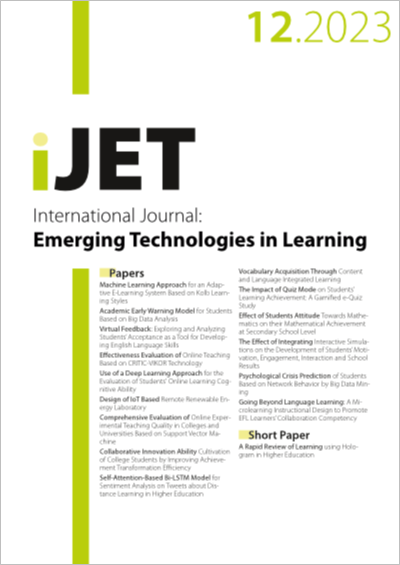Use of a Deep Learning Approach for the Evaluation of Students' Online Learning Cognitive Ability
DOI:
https://doi.org/10.3991/ijet.v18i12.41093Keywords:
Deep learning, College students’ online learning, Cognitive ability evaluationAbstract
The cognitive ability evaluation of college students' online learning still faces many challenges. Evaluation of college students' online learning cognitive ability is helpful to monitor the learning effect and progress of students, so as to detect problems in time, make suggestions and take corresponding measures to improve. However, the existing evaluation methods for the cognitive ability of college students' online learning often only focus on the degree of knowledge mastery of students, while ignoring the performance of students' learning strategies, autonomous learning ability and emotional attitude in the online learning process. And it is often impossible to understand the learning status of students in real time. To this end, this article studies the evaluation method of college students’ online learning cognitive ability based on deep learning. The evaluation of online learning cognitive ability of college students is divided into two parts: online learning ability evaluation and learning recursive ability evaluation. By introducing the learning ability layer and the learning recursive ability layer into the dynamic key-value memory network and constructing the corresponding evaluation model, it’s better to evaluate the online learning cognitive ability of college students. Based on the historical learning behavior data of students in the online learning process, the online learning cognitive state is predicted, and the performance of the model is further improved through data enhancement and self-attention mechanism. Experimental results verify the validity of the constructed model.
Downloads
Published
How to Cite
Issue
Section
License
Copyright (c) 2023 Nan Zhang (Submitter); Lili Zhao

This work is licensed under a Creative Commons Attribution 4.0 International License.


